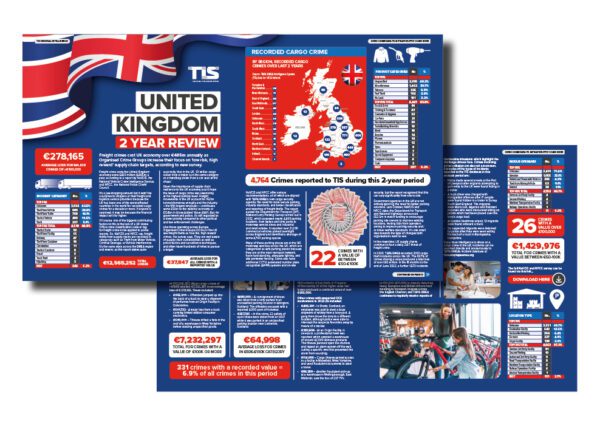
Freight Crimes Cost UK Economy more than €485m Annually…
Freight crime costs the United Kingdom economy some £420 million (€485m) a year, according to a report by NaVCIS, the National Vehicle Crime Intelligence Service, and NPCC, the National Police Chiefs’ Council.
It’s a jaw-dropping amount but it won’t be a surprise to shippers or their freight and logistics service providers because the UK has been one of the worst-affected countries in the world for recorded cargo crimes for a decade or more. If anyone is surprised, it may be because the financial impact isn’t far higher.
Of course, one of the biggest contributing factors to this is the lack of a UK Home Office crime classification code or tag for freight crime to be applied to police reports. So, NaVCIS and NPCC say, freight thefts from supply chains are recorded in categories such as Theft from Motor Vehicle, Criminal Damage, or Vehicle Interference. It’s the same story across the EMEA region and means, as the report states quite succinctly, that in the UK, ‘£1 million cargo stolen from a trailer is in the same category as a handbag stolen from a car seat at the shops’.
Given the importance of supply chain resilience to the UK economy, you’d hope the issue of cargo crime was resonating at the highest political level. Freight movements in the UK account for 152bn tonne-kilometres annually and the industry – the fifth largest employer – contributes some £12bn to the national economy or £124bn in Gross Added Value (GAV). But, for government and police, it’s still regarded as a lower priority compared to other political and law enforcement challenges.
Like those operating across Europe, Organised Crime Groups (OCGs) in the UK see freight thefts as ‘low risk, high reward’ crimes, the survey says. They are well aware of supply chain vulnerabilities as well as police tactics and surveillance techniques and often travel hundreds of miles to pursue a target.
NaVCIS and NPCC offer various recommendations, all of which are aligned with TAPA EMEA’s own cargo security agenda; the need for more secure parking, industry standards, and better classification and reporting of freight thefts. The report quotes the Department for Transport (DfT) National Lorry Parking Survey carried out in 2022, which assessed nearly 4,400 parking locations, from laybys and lorry parks to motorway service areas and industrial and retail estates. It reported over 21,200 commercial vehicles parked overnight across England and identified a shortage of some 4,700 parking spaces.
Many of these parking places are at the 145 motorway service across the UK, which are categorised as safe parking places because they are on the main transport network, have hard standing, adequate lighting, and site perimeter fencing. Some also have additional CCTV, automated number plate recognition (ANPR) systems and on-site security, but the report recognised that this can vary significantly from site to site.
Government agencies in the UK are not entirely ignoring the need for better parking solutions. Last October, NaVCIS and NPCC state, the Department for Transport and National Highways announced £52.5m in match funding to encourage parking site owners to improve existing locations, inviting bids from operators aiming to improve parking security and/or driver welfare standards. It’s one small step towards the type of changes both organisations want to see.
In the meantime, UK supply chains continue to face a daily, 24/7 threat of freight crime.
In 2020, TAPA EME recorded 3,100 cargo theft incidents across the UK. The 83.7% crimes sharing a value produced a total loss of over £92 million. In the 18 months to the end of June 2022, a further 1,573 incidents were added to the Association’s crime database, including major incidents with an average loss of €250,833.
One noticeable trend is also the far lower number of crime reports stating the financial loss value, only 5.8% in TAPA EMEA’s last Cargo Theft Report.
In the last 24 months, the Association has collated date on nearly 5,000 freight thefts in all regions of the UK and losses of €12,565,252. Major cargo crimes of >€100K totalled €7,232,297 or an average loss of €278,165. These included:
- €855,800 – Offenders jumped up into the back of a truck to steal a shipment of perfumes from an Origin Facility in Oxfordshire.
- €561,732 – A major loss from a truck carrying limited edition consumer electronics.
- €500,000 – Thieves drilled a hole in the roof of a warehouse in West Yorkshire before stealing unspecified goods.
- €480,000 – A consignment of shoes was taken from a lorry parked in an unclassified parking location in Abington, Scotland. The offenders escaped with a reported 4,000 pairs of footwear.
- €257,745 – In this crime, 22 pallets of sport shoes were stolen from an HGV while it was parked in an unclassified parking location near Lockerbie, Scotland.
- €204,244 – In Litchfield, West Midlands, a driver made two unscheduled stops before reaching their intended delivery destination. On arrival, the security seals on the trailer were missing and cargo, including mobile phones, was missing.
- €197,168 – Two trailers loaded with tyres where stolen from a vehicle at the Port of Liverpool.
- €178,650 – Police officers recovered a stolen truck and its cargo of metal following a tip-off in Osmotherley, Yorkshire. A member of the public called police when they spotted a trailer without a number plate and its lights tampered with. When the police arrived on the scene, they arrested the driver and passenger. The metal has been stolen in a previous incident in Cleveland.
- €147,147 – Two people were charged with the theft of consumer goods from trucks parked at Gloucester Services.
- €138,120 – 13 high value bicycles and bicycle frames were stolen from a facility in Moneymore, Northern Ireland.
- €116,128 – Offenders cut a hole in a cargo facility wall in Loanhead, Scotland, in order to steal 150 e-scooters.
Over this 24-month period, the other big trend has been the sudden and significant rise in fuel thefts across the country, often small quantities of diesel at a time, possibly by vehicle owners seeking fuel for their own personal use after the escalation of fuel prices at the official petrol pumps. The TAPA EMEA Intelligence System (TIS) recorded 184 incidents of fuel thefts in 11 regions of the country. 10 of the higher value fuel losses produced a combined value of over €365,000.
Other crimes with suspected OCG involvement in 2022/23 include. Targeted, high value attacks included:
- €406,291 – In Shotts, Scotland, an employee was paid to steal a large shipment of whisky from a lorry yard. A gang then drove the lorry to a different location, although police were able to intercept the suspects five miles away by means of a tracker.
- €282,506 – At an Origin Facility in Liverpool, a professional heist was reported which emptied a warehouse of around 42,000 skincare products. The thieves jammed open the shutters and ripped an alarm system off the wall, cutting a specific wire that prevented the alarm from sounding.
- €114,000 – Cargo thieves gained access a facility in Wakefield, West Yorkshire, and used fraudulent documents to steal a trailer.
- €86,359 – Another fraudulent pick-up at warehouse in Wellingborough, East Midlands, saw the loss of 237 TVs.
Internal thefts involving company employees are also increasing. TIS has received numerous crime reports featuring this M.O, such as:
- A warehouse employee was caught red-handed stealing more than €20,000 of mobile phones and computer memory boards. The theft was uncovered after the employee was searched by security staff at the end of his shift. They found a number of phones on his person as well as computer memory boards in his car, which he was reportedly planning to sell to pay for maintenance on his car.
- A truck driver was involved in the heft of a shipment of inflatable hot tubs and garden (furniture in Wales.
- An employee at a distribution centre in Coventry, West Midlands, stole thousands of euros of smart watches.
The recent and dramatic increase in fines for drivers of trucks found to have migrant stowaways onboard, up from a potential £2,000 (€2,500) per migrant to £10,000 (€11,000) is already deterring many European and British drivers from wanting to transport cargoes across the English Channel, and TAPA EMEA continues to regularly receive reports of clandestine intrusions which highlight the challenge drivers face. Crimes involving driver collusion are also not uncommon. Examples of the types of incidents reported to the TIS database in this analysis period are:
- Police made several arrests at the Port of Liverpool after migrants attempting to gain entry to the UK were found hiding in a trailer.
- A truck driver was charged with immigration offences after 17 people were found hidden in a trailer in Surrey, South East England. The migrants were Moroccan, Algerian and Pakistani nationals who were discovered sitting on pallets which had been placed over the lorry’s cargo load.
- At London Heathrow airport, 13migrants were found onboard a truck.
- Six suspected migrants were detained by police after they were seen getting exiting the back of a truck in Basingstoke, Hampshire.
If you have intelligence to share on a cargo crime in the UK, incidents can be reported directly and anonymously to TAPA EMEA incident database at tisteam@tapaemea.org

















